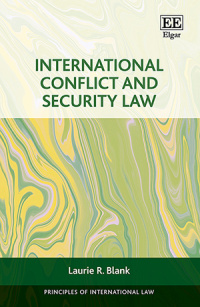
Hardback
Research Handbook on NATO
This timely Research Handbook provides novel insights into the institutional complexities of the North Atlantic Treaty Organization (NATO). Through a defined focus on the post-Cold War evolution of NATO, it provides various theoretical perspectives on the Alliance and assesses wider research efforts within NATO studies.
More Information
Critical Acclaim
Contributors
More Information
This timely Research Handbook provides novel insights into the institutional complexities of the North Atlantic Treaty Organization (NATO). Through a defined focus on the post-Cold War evolution of NATO, it provides various theoretical perspectives on the Alliance and assesses wider research efforts within NATO studies.
Written by thirty renowned international scholars and practitioners, chapters provide multidisciplinary insights into NATO’s legal and political developments. They examine existing research ventures within NATO scholarship, as well as potential future methodological advancements. The Research Handbook looks closely at NATO’s political and military decision-making, its principles of governance and its key fields of action. It additionally offers a significant analysis of the organization’s stability and cohesion.
This comprehensive Research Handbook will be important for academics studying law, politics and international relations surveying the intricacies of regional organizations. It will be particularly beneficial for NATO practitioners and for researchers endeavouring to further the field of NATO studies.
Written by thirty renowned international scholars and practitioners, chapters provide multidisciplinary insights into NATO’s legal and political developments. They examine existing research ventures within NATO scholarship, as well as potential future methodological advancements. The Research Handbook looks closely at NATO’s political and military decision-making, its principles of governance and its key fields of action. It additionally offers a significant analysis of the organization’s stability and cohesion.
This comprehensive Research Handbook will be important for academics studying law, politics and international relations surveying the intricacies of regional organizations. It will be particularly beneficial for NATO practitioners and for researchers endeavouring to further the field of NATO studies.
Critical Acclaim
‘Rarely has a collection about NATO been available that contains such a wealth of insights for scholars, students and practitioners alike. Anyone involved with this organization for practical purposes or out of academic interest will find this Research Handbook invaluable and will refer to it often.’
– Carlo Masala, Bundeswehr University, Munich
‘This excellent collection of papers brings together valuable works by accomplished experts on many NATO-related topics, including theoretical, legal, economic, operational and institutional interpretations, cyber security and counter-terrorism challenges and political–military decision-making about core tasks such as collective defence and deterrence, cooperative security and crisis management.’
– David S. Yost, U.S. Naval Postgraduate School
– Carlo Masala, Bundeswehr University, Munich
‘This excellent collection of papers brings together valuable works by accomplished experts on many NATO-related topics, including theoretical, legal, economic, operational and institutional interpretations, cyber security and counter-terrorism challenges and political–military decision-making about core tasks such as collective defence and deterrence, cooperative security and crisis management.’
– David S. Yost, U.S. Naval Postgraduate School
Contributors
Contributors include: David P. Auerswald, Michael Bothe, Tobias Bunde, Joe Burton, Nikoleta P. Chalanouli, Damon Coletta, Ian Davis, John R. Deni, Ulrich Franke, Heidi Hardt, Sebastian Harnisch, Toshihiro Ihori, Ivan Dinev Ivanov, Seth A. Johnston, Markus Kaim, Henrik B.L. Larsen, Sebastian Mayer, Martin C. McGuire, Andrés B. Muñoz-Mosquera, Shintaro Nakagawa, Falk Ostermann, Luca Ratti, Giray Sadik, Stephen M. Saideman, Martin A. Smith, Joshua B. Spero, Christian Tuschhoff, Nicholas Williams, Aybike Yalçın-İspir, Benjamin Zyla




